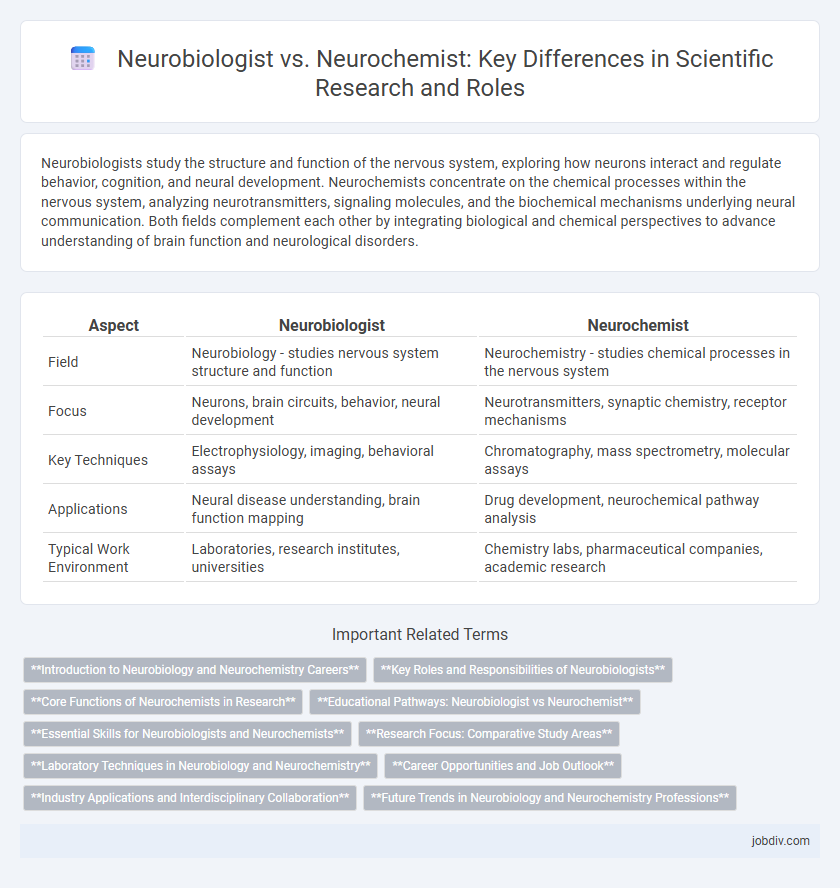Neurobiologists study the structure and function of the nervous system, exploring how neurons interact and regulate behavior, cognition, and neural development. Neurochemists concentrate on the chemical processes within the nervous system, analyzing neurotransmitters, signaling molecules, and the biochemical mechanisms underlying neural communication. Both fields complement each other by integrating biological and chemical perspectives to advance understanding of brain function and neurological disorders.
Table of Comparison
| Aspect | Neurobiologist | Neurochemist |
|---|---|---|
| Field | Neurobiology - studies nervous system structure and function | Neurochemistry - studies chemical processes in the nervous system |
| Focus | Neurons, brain circuits, behavior, neural development | Neurotransmitters, synaptic chemistry, receptor mechanisms |
| Key Techniques | Electrophysiology, imaging, behavioral assays | Chromatography, mass spectrometry, molecular assays |
| Applications | Neural disease understanding, brain function mapping | Drug development, neurochemical pathway analysis |
| Typical Work Environment | Laboratories, research institutes, universities | Chemistry labs, pharmaceutical companies, academic research |
Introduction to Neurobiology and Neurochemistry Careers
Neurobiologists study the structure, function, and development of the nervous system, emphasizing cellular and molecular mechanisms underlying neural processes. Neurochemists focus on the chemical composition and interactions within the nervous system, analyzing neurotransmitters, neuropeptides, and enzymatic pathways. Both careers require strong foundations in biology and chemistry, with neurobiologists often engaging in electrophysiology and neurochemists specializing in biochemical analysis techniques.
Key Roles and Responsibilities of Neurobiologists
Neurobiologists investigate the structure, function, and development of the nervous system at cellular and systemic levels, emphasizing neural pathways and behaviors. They utilize techniques like electrophysiology, imaging, and molecular biology to study neuron interactions and brain plasticity. Their research advances understanding of neurological diseases, neural regeneration, and cognitive functions essential for developing therapeutic interventions.
Core Functions of Neurochemists in Research
Neurochemists specialize in studying the chemical processes and molecules that influence neuronal function, including neurotransmitters, neuropeptides, and enzymes involved in synaptic transmission. Their core functions involve analyzing brain chemical composition, investigating cellular signaling pathways, and developing models to understand neurochemical interactions in neurological disorders. This work enables the identification of potential therapeutic targets and the creation of novel pharmacological treatments for diseases like Alzheimer's, Parkinson's, and depression.
Educational Pathways: Neurobiologist vs Neurochemist
Neurobiologists typically pursue a Bachelor's degree in biology or neuroscience, followed by a Ph.D. specializing in neural systems or brain function, emphasizing in vivo studies and behavioral analysis. Neurochemists begin with undergraduate studies in chemistry or biochemistry and advance to graduate research focused on the chemical processes and molecular interactions within the nervous system. Both pathways require extensive laboratory experience, but neurochemists often engage in detailed molecular assays while neurobiologists emphasize integrative physiological techniques.
Essential Skills for Neurobiologists and Neurochemists
Neurobiologists require strong analytical skills, expertise in neuroanatomy, and proficiency in electrophysiological techniques to study neural circuits and brain function. Neurochemists must excel in chemical analysis, molecular biology, and spectroscopy methods to investigate neurotransmitter dynamics and synaptic processes. Both professions demand critical thinking, proficiency in data interpretation, and experience with laboratory technologies specific to neuroscience research.
Research Focus: Comparative Study Areas
Neurobiologists primarily investigate the structural and functional aspects of the nervous system, emphasizing neural circuits, brain behavior relationships, and neurodevelopmental processes. Neurochemists focus on the chemical composition and molecular mechanisms within neurons, including neurotransmitter functions, synaptic transmission, and neurochemical signaling pathways. Comparative study in these fields highlights neurobiologists' emphasis on physiological and cellular interactions, while neurochemists concentrate on biochemical processes underlying neural activity.
Laboratory Techniques in Neurobiology and Neurochemistry
Neurobiologists primarily utilize electrophysiological techniques, such as patch-clamp recordings, to study neuronal activity and synaptic functions, whereas neurochemists focus on chromatographic methods, including high-performance liquid chromatography (HPLC), to analyze neurotransmitter composition and metabolic pathways. Fluorescence microscopy and immunohistochemistry are common tools in both fields for visualizing neural structures and protein expression. Advanced mass spectrometry techniques in neurochemistry enable detailed molecular profiling, while neurobiology often employs calcium imaging to monitor intracellular signaling dynamics.
Career Opportunities and Job Outlook
Neurobiologists frequently find career opportunities in academic research, healthcare, and pharmaceutical industries, focusing on understanding neural systems and brain functions. Neurochemists, specializing in the chemical processes of the nervous system, have strong job prospects in drug development, clinical laboratories, and biotechnology firms. Both fields show growth driven by advancements in neuroscience, with increasing demand for expertise in neurodegenerative diseases and cognitive disorders research.
Industry Applications and Interdisciplinary Collaboration
Neurobiologists primarily contribute to pharmaceutical development and neurological disorder diagnostics by studying brain function and neural mechanisms, while neurochemists focus on the biochemical pathways and molecular interactions relevant in drug design and metabolic engineering. Industry applications often intersect as neurobiologists provide insights into neural circuitry for advanced neuroprosthetics, whereas neurochemists enable the creation of targeted neuropharmaceuticals through chemical synthesis and receptor analysis. Interdisciplinary collaboration between neurobiologists and neurochemists drives innovation in brain-machine interfaces, personalized medicine, and neurotoxicology by combining functional neural data with molecular activity profiling.
Future Trends in Neurobiology and Neurochemistry Professions
Future trends in neurobiology and neurochemistry professions emphasize the integration of advanced techniques such as optogenetics, CRISPR gene editing, and single-cell RNA sequencing to unravel complex neural circuits and molecular mechanisms. Growing demand for personalized medicine and neuropharmacology drives interdisciplinary collaboration, merging computational neuroscience with neurochemical profiling for targeted therapies. Emerging career opportunities will prioritize expertise in neuroinformatics, synthetic biology, and neuroengineering to address neurodegenerative diseases and brain-machine interfaces.
Neurobiologist vs Neurochemist Infographic

 jobdiv.com
jobdiv.com